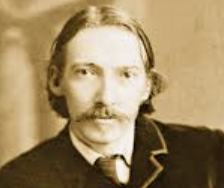
Robert Louis Stevenson — The Philosopher of Adventure, Duality, and the Art of Living (1850–1894)
Robert Louis Stevenson was not a philosopher by profession, but he was one by temperament. Through essays, fiction, and travel writing, he explored questions of character, self-division, courage, and meaning with a clarity few academic philosophers achieve. Stevenson believed that how one lives matters more than what one concludes, and that wisdom is inseparable from vitality, risk, and style.
A Fragile Body and a Restless Spirit
Born in Edinburgh into a family of lighthouse engineers, Stevenson was expected to follow a respectable professional path. Instead, chronic illness shaped a different destiny. Frequently bedridden and aware of mortality from an early age, he developed an intense inner life and a sharpened sensitivity to experience.
His weak health did not produce withdrawal. It produced urgency. Stevenson traveled obsessively — through France, the United States, and eventually the South Pacific — driven by the conviction that life must be lived vividly, even if briefly.
“The world is so full of a number of things, I’m sure we should all be as happy as kings.”
The Moral Psychology of Dr. Jekyll and Mr. Hyde
Stevenson’s most philosophically enduring work, The Strange Case of Dr. Jekyll and Mr. Hyde, is a study of moral dualism. Long before Freud, Stevenson recognized that human beings are not unified selves, but composites of conflicting drives, impulses, and ideals.
Evil, in Stevenson’s view, is not an external monster. It is an internal possibility — intensified by repression, denial, and moral pretense. Jekyll’s tragedy is not that Hyde exists, but that he refuses responsibility for him.
The self is not something discovered. It is something managed.
“Man is not truly one, but truly two.”
Adventure as an Ethical Ideal
Stevenson believed that adventure was not escapism, but a moral necessity. Risk, effort, and uncertainty are the conditions under which character forms. Comfort dulls the soul. Difficulty sharpens it.
Works like Treasure Island and Kidnapped are not merely boys’ stories. They dramatize ethical growth — loyalty tested by danger, courage shaped by fear, and identity forged through action.
For Stevenson, a good life is not a safe one, but a spirited one.
“Life is not a matter of holding good cards, but of playing a poor hand well.”
Essays on Living — Against Moral Perfectionism
In essays like El Dorado, An Apology for Idlers, and Virginibus Puerisque, Stevenson argued against moral rigidity. He distrusted systems that demanded purity, consistency, or final answers.
Life, he believed, is inherently unfinished. Failure is not a moral catastrophe. It is part of the human condition. What matters is effort, generosity, and the refusal to harden into bitterness.
Ethics, for Stevenson, is a matter of tone rather than doctrine.
“To be what we are, and to become what we are capable of becoming, is the only end of life.”
Exile, Samoa, and the Final Chapter
Stevenson spent his final years in Samoa, where he became deeply involved with local politics and earned the respect of the islanders, who called him Tusitala — “the teller of tales.”
He died suddenly at forty-four, in the midst of creative productivity. His grave overlooks the sea — a fitting end for a writer who believed that movement itself was a form of meaning.
Legacy — Wisdom Without System
Stevenson left no philosophy, only insight. He distrusted abstraction, embraced contradiction, and treated life as an art rather than a problem.
He reminds us that clarity does not require coldness, that seriousness need not be solemn, and that the deepest truths are often smuggled inside stories.
In Stevenson, thought walks on two legs — imagination and honesty — and refuses to stand still.
“The cruelest lies are often told in silence.”
CivilSimian.com created by AxiomaticPanic, CivilSimian, Kalokagathia
